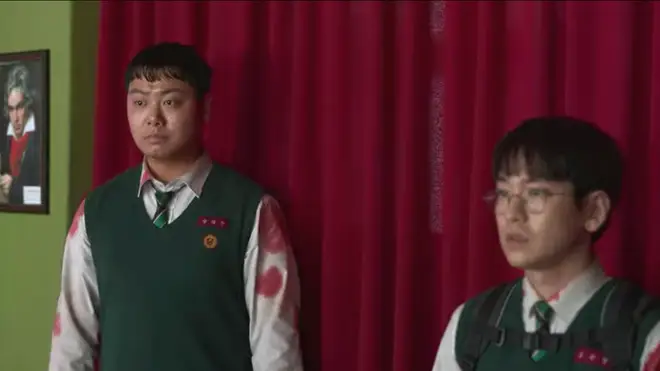On Air Now
Calm Classics with Myleene Klass 10pm - 1am
9 February 2022, 17:22 | Updated: 9 February 2022, 20:07

South Korean Zombie thriller, ‘All of Us Are Dead’, is now the fifth most-watched non-English Netflix original ever.
All of Us Are Dead is a coming-of-age zombie horror series which premiered on Netflix at the end of January 2022.
The premise of the show focuses on a group of students at Hyosan High School trying to survive the zombie apocalypse, which was accidentally started by their science teacher.
The show features commentary on various societal issues, ranging from teen pregnancy, to suicide, and bullying, to the misuse of power.
Following in the bloody footsteps of Squid Game, the show is the second ever K-drama to hit the number one spot on the Netflix charts and has already racked up 361 million hours of view time in its first two weeks.
But with familiar tunes mixed in with creepy new compositions, how many viewers were able to decode the show’s hidden musical messages within its spine-chilling soundtrack? Read on for spoilers...
Read more: What classical music is used in Squid Game?

Watch the trailer for All Of Us Are Dead
In one of the most heartbreaking scenes of the series, a familiar tune highlights a deep friendship between two of our protagonists.
From episode one, the friendship between Lee Cheong-san and Han Gyeong-su is prominently features, with Gyeong-su being invited to Cheong-san’s mother’s new restaurant to try her chicken. Before they leave to go get chicken, Gyeong-su playfully whistles the tune, which many of the Netflix show’s international audience will recognise as ‘Auld Lang Syne’.
However, the tune of ‘Auld Lang Syne’ has a different meaning in South Korea. The originally Scottish tune is thought to have been brought to Korea towards the end of the 19th century by Western missionaries.
During the same time, Korea had begun meeting with foreign countries, which ultimately gave rise to nationalism and patriotism. This inspired the country to create a patriotic song, an ‘Aegukga’.
The first Aegukga was sung to the tune of ‘Auld Lang Syne’, before being abandoned in 1936 for a new melody composed by Ahn Eak-tai.
Read more: What is South Korea’s national anthem, and what are the lyrics?

"애국가" - Anthem of The Korean Government In Exile
In other parts of the world, ‘Auld Lang Syne’ is sung on the stroke of midnight on New Year’s Eve every year, and it’s associated with not forgetting old friends.
So it’s particularly poignant that in episode three during a scene where Cheong-san and Gyeong-su are separated by a soundproof door, the two whistle ‘Auld Lang Syne’ to each other.
They can’t hear each other as Gyeong-su has been locked in a broadcasting studio with a suspected zombie bite. While Cheong-san and the other students wait for their friend to finish his 30-minute quarantine – to ensure he won’t turn into a zombie – Gyeong-su can see Cheong-san begin to whistle through a window in the soundproof door, and knowing what his friend is whistling, joins in.
The lyrics of ‘Auld Lang Syne’ are reminiscent of good times among friends, and as well as New Year, the tune is also sung at events like funerals, and graduations, as a farewell song.
The show’s creators tug at the audience’s heart strings with this choice of song, because less than five minutes after the wistful whistling takes place, Gyeong-su is betrayed by a fellow classmate and sadly transforms into a zombie.
The use of ‘Auld Lang Syne’ means the creators were foreshadowing their friendship’s fate and slyly giving Cheong-san and Gyeong-su a chance to reminisce and say farewell with this subtle musical message.
Read more: What are the lyrics to Auld Lang Syne, and what does Auld Lang Syne actually mean?
One of the first pieces of music heard in the zombie series is Gregorio Allegri’s ‘Miserere mei, Deus’. The work is performed by the Hyosan High School choir and due to the difficult nature of the piece, it at first seems an odd choice for a school choir repertoire.
The work features a top C, which is an incredibly difficult pitch to control, especially for inexperienced singers at a high school choir level. The show perhaps tries to explain this away with posters for the 2021 ‘High School Choir Choral Competition’ seen in the background of various shots, suggesting that the choir is at a national level.
However, the lyrics give us an insight into the producers’ choice of music for the choir recording, which is captured on a video camera prior to the zombie outbreak at Hyosan High, and perhaps also foreshadows the fate of the students singing.
Read more: What is it like to sing the top C in Allegri’s Miserere? We asked a boy treble

Choir sings exquisite rendition of Allegri's 'Miserere mei, Deus'
The Latin translation of ‘Miserere mei, Deus’ is ‘Have mercy on me, O God’ which is perhaps what many students would have been thinking when the zombie outbreak began.
29 percent of the population of South Korea practise Christianity, and references to religion and praying to a God are common throughout the series.
The musical setting of Psalm 50 includes the lyrics (translated from Latin), ‘Behold, I was shapen in wickedness’, and ‘Turn thy face from my sins’.
The student singers seem to be foreshadowing their transformation into zombies, and warning the audience of this song to look away from the sins they commit when they turn into these monsters.
The recording of the school choir returns in episode seven, and the escaping students use the ‘Miserere’, playing full volume from the video camera, to draw in the zombies while they escape from the music room.

Schubert’s piano sonata is heard in episode six when the students decide to mount a daring escape from the school’s broadcast room where they have been sheltering since early on in the zombie outbreak.
The students find a CD which they can use to broadcast sound from certain speakers in the school, to draw zombies away from their potential escape route.
The only CD they can find is a meditation, where a narrator speaks over the dulcet tones of the second movement (Andante) of Schubert’s Piano Sonata No.13 in A Major.
This musical message is less hidden as the narrator’s sporadic script fits perfectly with the on-screen action involving the zombies.
The narrator starts the track saying, “Time for meditation. Once again, another fun day at school. Everyone, close your eyes... and calm your hearts.”
The rest of his script is lost amidst the cacophony of guttural zombie noises and students’ dialogue, however we hear two more phrases from the narrator: “You must keep moving forward...”, which is said as Lee Soo-hyuk tries to lead the student’s escape, and “...will never perish even when all else withers and dies”, which is said as Yang Dae-su helps his fellow students.
It is notable that both of these characters who are spoken over by the ‘narrator’ survive until the end of the series, and perhaps a foreshadowing from the scriptwriters.
Read more: This gorgeous Schubert sonata is guaranteed to slow your heart rate
Lee Sung-hyun, also known as Mowg, is a multi award-winning South Korean composer and bassist known for his work across film and TV composition.
While a brief introduction, the show’s opening song is a creepy chorus made up of no more than six notes.
The monotonous tonal bass line is reminiscent of a heartbeat, that is steadily getting faster, alluding to the reaction of someone experiencing fear or anticipation.
The melody follows an ascending semi-tonal pattern; a technique used often in horror films.
Mowg’s sparse soundtrack underscores a series where the horrifying guttural noises of the zombies are as scary as the lengthy silences.
Read more: What’s so creepy about a semitone?
Season two is yet to be confirmed by Netflix, but due to the immense popularity of the first series within just two weeks since its launch, there’s every chance the student protagonists will be back with more hidden musical messages for us to uncover in the near future.
You can watch season one of All of Us Are Dead on Netflix now.